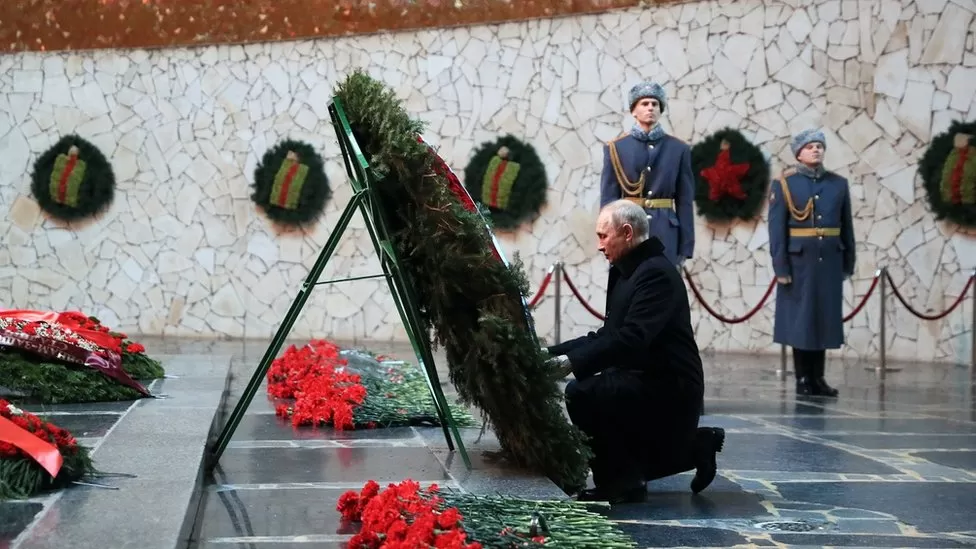Russian President Vladimir Putin has commemorated the 80th anniversary of the World War II Soviet victory over Nazi German forces in the battle of Stalingrad, and invoked the long and grueling fight as justification for the conflict in Ukraine.
Putin laid a wreath at the eternal flame of the memorial complex to the fallen Red Army soldiers in Volgograd, the current name of the city, which stretches along the western bank of the Volga River.
The memorial is dominated by an 85-meter (279-foot) sculpture of a sword-wielding woman, Europe’s tallest statue.
“Now, regrettably, we see that the ideology of Nazism, in its modern guise, in its modern manifestation, once again poses direct threats to the security of our country. Again and again we are forced to repulse the aggression of the collective West.”
Vladimir Putin
Putin and other Russian officials frequently characterize Ukraine as a hotbed of neo-Nazi beliefs, although Ukrainian President Volodymyr Zelenskyy is of Jewish descent.
Referring to Germany’s recent decision to supply advanced Leopard battle tanks, Putin warned that “a modern war with Russia will be quite different for them.”
“It’s incredible, but it’s a fact: they are threatening us again with German Leopard tanks with crosses painted on their armor.”
Vladimir Putin
“And they are again going to fight Russia on the territory of Ukraine with the hands of Hitler’s followers, the Banderites,” Putin said, referring to WWII-era Ukrainian nationalist leader, Stepan Bandera who was widely considered to be a Nazi collaborator.
In his speech, Vladimir Putin likened Russia’s invasion of Ukraine to the fight against Nazi Germany.
The battle of Stalingrad has deep resonance in Russia.
The five-month fighting between August 1942 and February 1943 is regarded as the bloodiest battle in history, with the death toll for soldiers and civilians reaching as high as 2 million.
Most of the city was reduced to rubble before Nazi forces surrendered on February 2, 1943.

It was a major turning point in the European theater of WWII and the battle remains an immense source of pride in modern Russia, lauded as a demonstration of military might and moral seriousness.
The city was renamed in 1961 as part of the Soviet Union’s rejection of dictator Joseph Stalin’s personality cult. Calls for the restoration of its old name have not gained the Kremlin’s approval.
Communist Party Head, Gennady Zyuganov, after laying flowers at the Unknown Soldier memorial outside the Kremlin, said he hoped Russian forces would prevail in Ukraine.
“To do this, it is necessary to adopt the unique experience of the victorious Red Army, the Battle of Stalingrad, Oryol, Kursk,” Zyuganov said.

Russia Could Move Beyond Conventional Weapons
Also, Putin hinted that he could seek to move beyond conventional weapons.
“Those who hope to defeat Russia on the battlefield do not understand, it seems, that a modern war with Russia will be very different for them. We are not sending our tanks to their borders, but we have the means to respond. It won’t be limited to the use of armoured hardware. Everyone must understand this.”
Vladimir Putin
Kremlin Spokesperson, Dmitry Peskov, declined to elaborate on Putin’s comments, but he told reporters that “as new weapons are delivered by the collective West, Russia will make greater use of its potential to respond”.
Volgograd was temporarily renamed Stalingrad for the day to mark the occasion, and earlier this week a new bust of the former Soviet leader, Joseph Stalin was unveiled.
Stalin, who led the Soviet Union between 1924 and his death in 1953, was accused of orchestrating a famine in Ukraine between 1932-33.
READ ALSO: Pope Urges Congo’s Youth To Work For A Peaceful And Honest Future





















